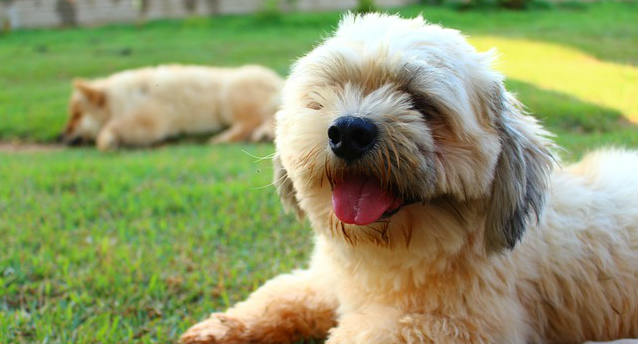My dog constantly needs their anal glands expressed. What is the cause and treatment?
Original Question: My dog’s anal glands have had to be expressed for about a year--anywhere from monthly to 8 – 10 weeks. She is still having cowpatty poops. Should I increase her fibre? She eats 1/2 cup of kibble with 1 teaspoon of weight science 2 times a day. Her treats are baby carrots and Greenies teeth brushing. She is a Lhasa/terrier mix. - Stacey
 Jun 21, 2019
Jun 21, 2019
Hi Stacey,
Anal glands can become impacted repeatedly for several different reasons. Loose stools are probably the most common in my experience but it can also be when the tubes that lead from the anal to the outside world become blocked. This can happen when there are deposits within the tube or there is inflammation around the anal area that is compressing the tubes, making them narrower and more likely to become blocked. Lastly, it can be down to breed-specific problems such as the tubes being malformed causing blockages.
Persistently loose stools are a completely separate topic that can be due to a number of different reasons. It can be caused by food intolerance, parasites, infections like Giardia, inflammatory bowel disease, hormonal problems that can cause chronic diarrhea and we could get organ disease such as exocrine pancreatic insufficiency where the pancreas just isn’t producing enough digestive enzymes leaving a watery, cow patty type stool which is what your dog has.
What we need to do is to try and figure out exactly why your dog’s stools are abnormal. It could have been because they have an upset stomach or they’ve gotten into something they shouldn’t eat but if the stools are loose for more than a week or two, that suggests that there is an underlying problem that’s going to need more treatment than just time.
Now getting to the bottom of the problem can sometimes be quite challenging and it can be a bit of a longer process as you work through a number of different tests or treatment trials that can involve taking stool samples or trying different diets. If we’re changing diets, we really need to give that a chance to work and so we’re going to need to feed those for about six to eight weeks before we change to a different diet and rule out that the current one didn’t work. Other things to consider would be giving parasite treatments, taking blood tests and doing imaging with X-rays and ultrasound. In the case of inflammatory bowel disease, it might be that we end up needing to take biopsies of the intestine or having an endoscopy done to have a little look at the lining of the intestines. So that’s a whole different category and like you can imagine it can take a long time to figure out what’s wrong and sometimes costs can add up. In the majority of cases we’re not going to have to do any of this at all and it’s relatively quick and straightforward but there’s the warning that it might not be.
Now adding fibre can absolutely help to improve stool consistency depending on the situation. So fibre is really important for the colonocytes which are the cells that line the colon. They require fibre to get their nutrition directly from the contents within the intestine, therefore, adding fibre can absolutely help and that can be by adding canned pumpkin or bran. Talk to your vet to discuss this before changing or adding anything to their diet because it isn’t going to be appropriate in every single dog.
Discuss with your what vet next steps you should take and have them examine your dog in general, feel their belly, listen to their heart, and take a history just to make sure that there are no other problems going on. Questions to consider would be, is there vomiting going on? Is there actually weight loss as well? Is the dog drinking more or urinating more? All of these things might give clues to help guide you on the next steps.
Regular expression is going to need to be kept up through the investigation and treatment because the last thing we want developing is an abscess. So if the anal glands get really full and they’re not expressed in time, they are going to start to become irritated, which is why dogs will scoot their bum along the ground or why they start chewing their backend. The contents will dry out and become infected and this can lead them to burst and form really painful abscesses that then burst out through the skin around the backend of a dog. Also, if we’re expressing them regularly, then generally it’s a very simple job. When the contents dry out or they become infected, it can sometimes become quite challenging to express them and by that time they’re already painful. In some cases, we’ll need to actually sedate a dog so that we can express them and flush them properly.
The bottom line is if you’ve got a dog with any problem, it might be that that problem is actually the result of another issue that needs to be investigated. In your situation, the anal glands are not being expressed naturally because the stools are loose and we need to look into what’s causing this. It’s a little bit like a dog with skin disease who’s itchy; while that itching isn’t the actual main cause of the problem, it might be that they’ve got an allergy and so you need to investigate and treat that allergy.
In the vast majority of cases, a few simple changes will be all that’s needed to make sure that anal gland expression isn’t performed on a consistent basis.
I hope this helps.
Dr. Alex Avery, BVSc


Disclaimer: healthcareforpets.com and its team of veterinarians and clinicians do not endorse any products, services, or recommended advice. All advice presented by our veterinarians, clinicians, tools, resources, etc is not meant to replace a regular physical exam and consultation with your primary veterinarian or other clinicians. We always encourage you to seek medical advice from your regular veterinarian.

